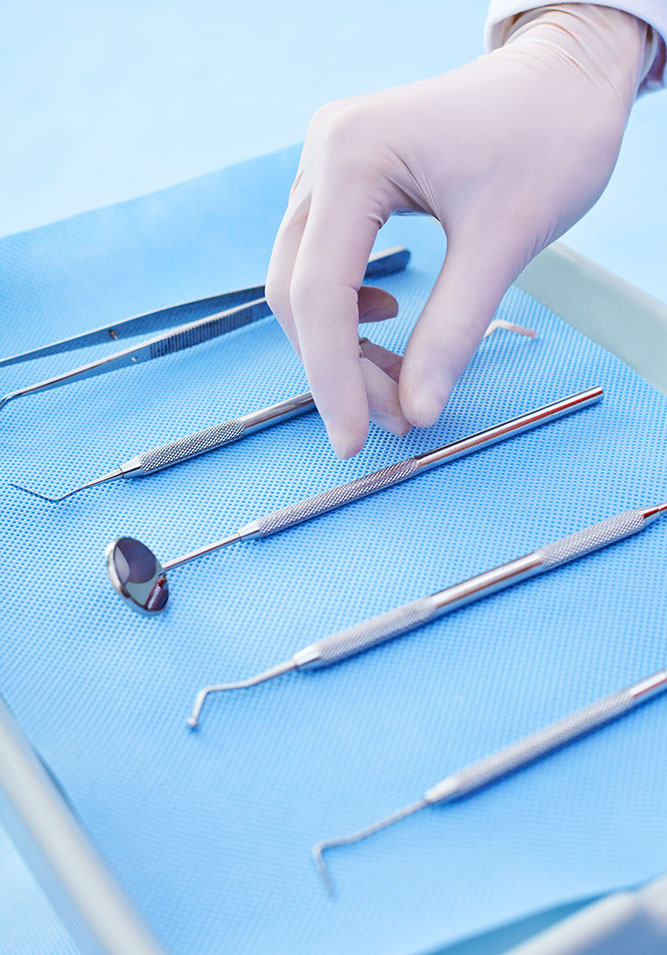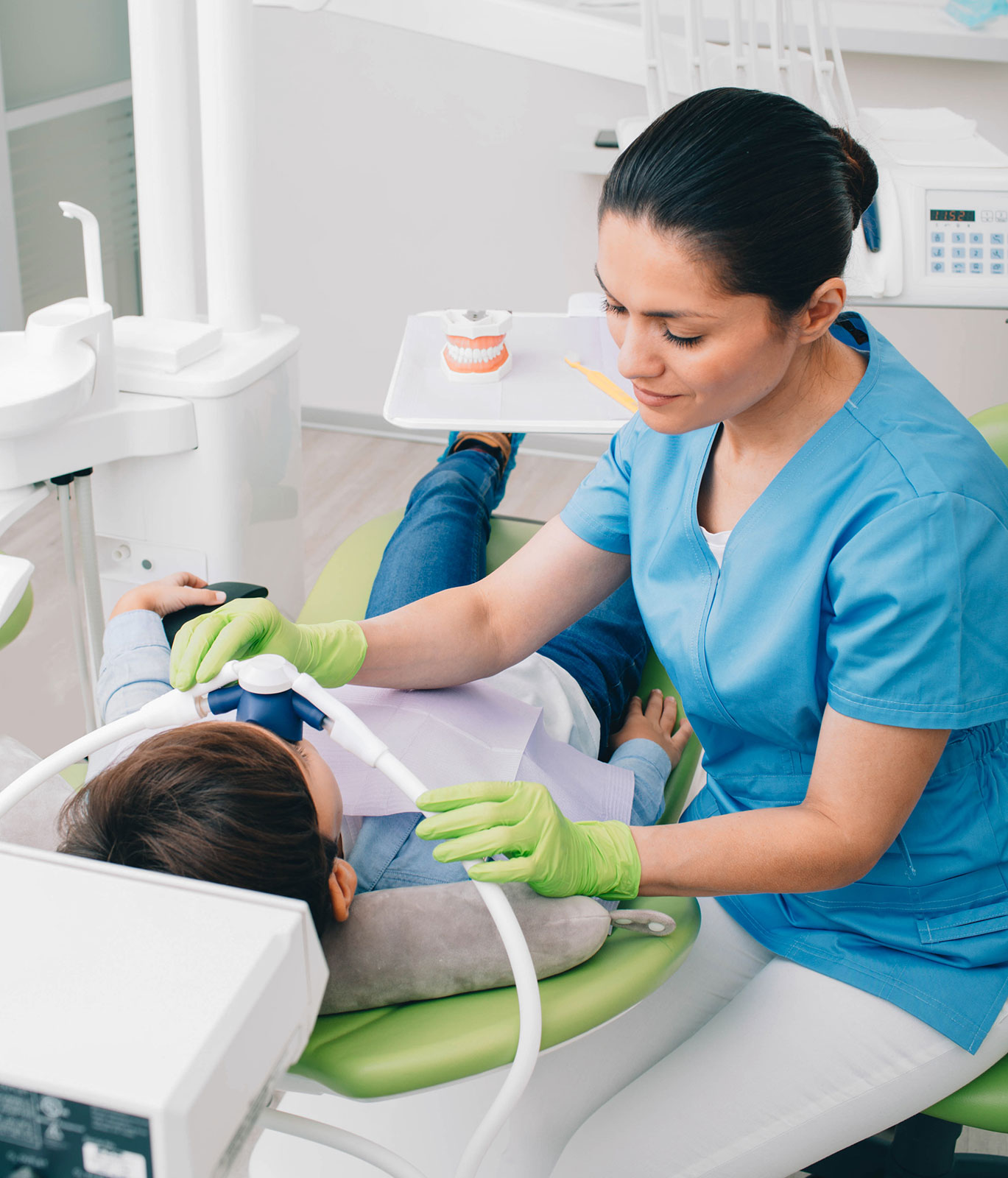Often, the reason why someone needs an oral surgery procedure is due to a serious dental condition that can cause or is causing a lot of pain. If you’re experiencing dental pain or discomfort, there is a solution and we can help!
Oral Surgery
Oral Surgery
Oral surgery is a specialty in dentistry that encompasses everything from simple extractions to dental implants.
Depending on the level of training a dentist receives, they can offer a variety of surgical treatments to address issues with the teeth, gums, and jawbone.
Dr. Omid Barkhordar, provides a safe, compassionate environment so that when you need to have these procedures you feel as comfortable and confident as possible.
WHEN IS ORAL SURGERY TREATMENT NECESSARY?
Here are the top reasons why patients need extractions and other surgical procedures.
DENTAL DECAY
Left unattended, dental decay can quickly spread, killing the roots of your teeth and damaging the tooth, as well as the surrounding bone if you experience an active infection.
To alleviate your pain and prevent further damage, it may be necessary to remove the infected teeth. Dr. Omid will thoroughly discuss why an extraction is preferred over root canal treatment.
PERIODONTAL DISEASE
Periodontal (gum) disease is the leading cause of tooth loss in adults. The disease is caused by bacteria that are attracted to the plaque that builds up on your teeth. If the plaque isn’t removed, it not only continues to build up, but it also calcifies (tartar or calculus). Once you have tartar on your teeth or roots of your teeth, it is impossible to remove without special dental instruments.
Left untreated, the bacteria-laden plaque and tartar cause gum irritation and inflammation. Your gums will start to bleed. They’ll be tender and red.
Gum disease is an active infection that damages the gingiva (gum) tissues, as well as the bone surrounding the teeth. Eventually, the gingiva and bone begin to recede, leaving less supporting structures to keep the teeth anchored in the mouth. They become loose and need to be extracted.
INJURY OR ACCIDENT
Certain injuries may require oral surgery in order to restore the appearance or function of your teeth, gums, or jawbone.
OTHER HEALTH ISSUES
There are a variety of health issues that can indicate a need for oral surgery. If you are experiencing difficulty chewing, constant headaches, chronic sinus pain, or even sleep apnea, we may recommend surgery on or around your jaw to alleviate these symptoms.


WHAT TYPES OF ORAL SURGERY OPTIONS ARE AVAILABLE FROM YOUR SANTA BARBARA DENTIST?
Our skilled dentists offer a number of services and procedures to address your oral health concerns.
SIMPLE TOOTH EXTRACTION VS. SURGICAL EXTRACTION - WHICH WILL I NEED?
Typically, a simple extraction is one in which a single tooth is removed and it can be removed with forceps alone. The procedure is straightforward. Your dentist administers anesthesia. When you’re completely numb, your dentist will use forceps to remove the tooth, gently applying pressure to ease the tooth out of the bone.
In more complex cases, a surgical extraction is indicated. If you have an impacted wisdom tooth, for example, your dentist will need to make an incision in the gums to access the tooth. Once it has been removed, Dr. Omid will suture the gingiva.
WHY MIGHT A PATIENT NEED A ROOT TIP EXTRACTION?
There are at least three instances that require root tip extraction.
- Injury/broken tooth: If you’re hit in the face playing sports or during a car accident, your tooth may pop out in one piece. Unfortunately, this isn’t always the case. Sometimes, the crown of the tooth (the visible part) is fractured, leaving the roots. It is impossible to adhere the tooth to the roots, so your dentist will need to surgically remove the roots.
- Severe dental decay: At times, a tooth is so decayed that it fractures at the gumline, leaving the roots intact. Your oral surgeon will perform surgical root tip extraction to preserve the health of the gums, bone, and adjacent teeth.
- Infection in a tooth that has a root canal: Though uncommon, some people have experienced a post-root canal infection in the root of the tooth. Causes for this include calcified and curved canals that make it difficult to completely clean out the pulp tissue. Or, your tooth and root could be cracked, allowing bacteria into the root and causing an infection. Your dentist will need to surgically access the root of the tooth to remove the part of the root that’s infected, as well as any infected bone.
WHAT ARE DENTAL IMPLANTS?
Dental implants restore missing teeth. They look, feel, and function like natural teeth.
A dental implant is a metal anchor that is surgically placed into your jawbone. Dental implants can be used to replace a single tooth, or an entire arch!
Restoration of your tooth takes place in four phases.
- Phase I: Implant surgery. If the tooth isn’t already gone, your dentist will extract it and place the implant if your gums and bone are healthy.
- Phase II: After a few months of healing and allowing the implant to integrate into the bone, your surgeon will make a small incision in your gum tissue to expose the top of the implant. He’ll then place a healing cap to keep the implant clean while you heal.
- Phase III: A few months later, you’ll return to your Santa Barbara dental office for a crown preparation appointment. Your dentist will remove the healing cap and take an impression, which will be sent to a dental lab so they can fabricate a custom implant crown.
- Phase IV: Once we receive the crown from the lab, we’ll try it in, check the bite and margins for a good fit. Adjustments will be made if necessary. Then, we’ll cement the crown.

WHAT IS BONE GRAFTING?
In some cases, a bone graft may be required if there is insufficient jawbone mass to hold a dental implant securely in place. Loss of bone can be caused by missing teeth, gum disease, or other diseases.
Your surgeon will make a small incision in the gum tissue to expose the bone. New bone is grafted onto the existing bone, after which the gingiva is sutured closed.
Bone material can come from your own body or from an animal source.
WHAT IS A SINUS LIFT?
A sinus lift is a type of bone graft that aims to restore bone levels in the upper jaw. When a patient has lost bone due to tooth or gum infection or because of long-term tooth loss, the jaw bone is so thin that placing an implant is impossible because the sinuses would be exposed.
Bone material is placed to augment the natural bone and provide enough structural support for an implant or implants.
WHAT IS JAWBONE (TMJ) SURGERY?
If your jaw bones aren’t properly aligned or are broken due to injury or accident, oral surgery may be necessary to restore the appearance and function. We may also recommend surgery on the area around your lower jaw to help address sleep apnea or snoring.
Some patients who have misaligned jaws need to have jaw surgery before they can undergo orthodontic treatment to improve their bite.
Additionally, patients who suffer from TMJ disorder, a painful condition affecting the temporomandibular joints, may need jaw surgery as a long-term solution to jaw pain and function.


WHY WOULD MY SURGEON ORDER 3D CT SCAN IMAGING?
A CT scan provides a 3D view of your jaw and provides valuable information that can be used in treatment planning. It can also be used to ensure precise placement of an implant.
In addition to being a useful tool for implant cases, a 3D CT scan can help your dentist with treatment planning in cases of pathology or reconstructive jaw surgery.
WHAT IS A SINUS LIFT?
A sinus lift is a type of bone graft that aims to restore bone levels in the upper jaw. When a patient has lost bone due to tooth or gum infection or because of long-term tooth loss, the jaw bone is so thin that placing an implant is impossible because the sinuses would be exposed.
Bone material is placed to augment the natural bone and provide enough structural support for an implant or implants.
HOW SHOULD I PREPARE FOR ORAL SURGERY?
Anticipating an oral surgery procedure can cause anxiety. We will help to ease your apprehension by making sure that you are fully informed about all of the procedures on your treatment plan and comfortable moving forward with the plan.
WHAT KIND OF ANESTHESIA WILL I RECEIVE DURING MY ORAL SURGERY?
For certain surgical procedures, numbing the tissue isn’t enough. Due to the time involved, the complexity of the case, and the patient’s anxiety level, sedation is sometimes needed. Dr. Omid offers three types of sedation:
- Oral sedation
- General anesthesia
- Nitrous oxide
HOW LONG DOES IT TAKE TO RECOVER AFTER ORAL SURGERY?
You’ll likely be somewhat sore after your procedure. Discomfort and even some swelling can occur for a few days after your procedure. After a few days, you’ll start to notice symptoms subside. It will take a few weeks and up to a month for your soft tissue to recover from the surgery.
WHAT KINDS OF POST-OP INSTRUCTIONS DO PATIENTS RECEIVE?
After your procedure, your dentist will provide you with detailed post-op instructions that are specific to the procedure they’ve just performed. Some common instructions include:
- Having a driver
- Avoid smoking
- Avoid drinking through a straw
- Gently rinse with warm salt water
- Stick to a soft diet
- Use ice to reduce swelling

HOW MUCH DOES ORAL SURGERY COST?
Oral surgery can cost between a few hundred dollars to tens of thousands for more complex surgeries, like jaw reconstruction.
Thankfully, insurance companies usually cover oral surgery procedures, often around 50%, though some companies may offer higher coverage.
Your Santa Barbara dental team will provide you with an estimate that includes an insurance breakdown of coverage. They’ll also discuss payment options, including outside financing.
